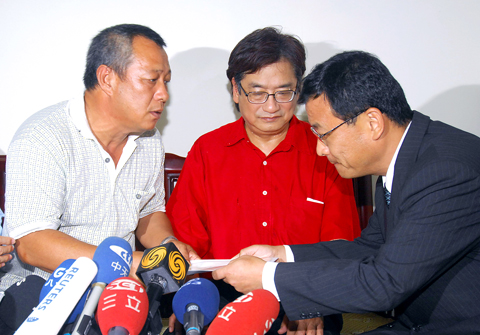Ten days after a Taiwanese boat sank following a collision with a Japanese patrol vessel near the disputed Diaoyutai (釣魚台) islands, a representative from Japan’s de facto embassy in Taiwan visited the home of the fishing boat captain and offered an apology yesterday.
Deputy chief representative of the Interchange Association Hitoshi Funamachi visited Taiwanese boat captain Ho Hung-yi (何鴻義) at his home in Ruifang Township (瑞芳), Taipei County, to personally deliver a letter of apology written by Hideo Nasu, head of the 11th Operational Region of the Japan Coast Guard.
“I bow and once again offer my sincere apologies to you over the sinking of your boat and the injuries you sustained during the collision,” Funamachi said to Ho, reading from Nasu’s letter. “I hope we will begin negotiations soon on compensation, in accordance with the law.”

PHOTO: SAM YEH, AFP
Nasu had also bowed at a televised press conference in Japan several days ago in apology over the accident.
Ho accepted Nasu’s apology, saying he was “very pleased” with the way that the Japan Coast Guard official was handling the aftermath of the accident, in which Ho lost his boat and sustained several injuries.
Meanwhile, after a 30-minute closed door meeting at the Ministry of Foreign Affairs with Minister of Foreign Affairs Francisco Ou (歐鴻鍊) yesterday afternoon, Tadashi Ikeda, the chief representative of the Interchange Association, said he hoped the peaceful end to the ordeal would strengthen Taiwan-Japan relations.
Standing next to Ou, Ikeda said he was pleased to see that Taiwan and Japan could “overcome the difficult situation together.”
“The Japanese have a saying that after the rain, the ground will be more solid and firm. I hope that Japan-Taiwan relations will continue to improve after this ordeal,” Ikeda said.
Ou welcomed the gesture by Japan, calling it a “perfect ending,” but said the next step in resuming negotiations with Tokyo on fishing rights and sovereignty claims would be the “beginning of the real, difficult task.”
The incident took place early in the morning on June 10 when a Japan Coast Guard patrol boat rammed into a Taiwanese fishing boat 11km off the Diaoyutai islands, an island chain claimed by Taiwan, Japan and China.
While the Japanese claim the crash was caused by the Taiwanese boat zigzagging abruptly, Ho insists his boat was stationary.
The Japanese agreed to release the crew and pay reparations, but held off on issuing a formal apology.
In related news, Ou yesterday confirmed that President Ma Ying-jeou (馬英九) had officially accepted the resignation of Taiwan’s representative to Japan, Koh Se-kai (許世楷), who asked to be relieved of his duties on Monday.

TRAGEDY STRIKES TAIPEI: The suspect died after falling off a building after he threw smoke grenades into Taipei Main Station and went on a killing spree in Zhongshan A 27-year-old suspect allegedly threw smoke grenades in Taipei Main Station and then proceeded to Zhongshan MRT Station in a random killing spree that resulted in the death of the suspect and two other civilians, and seven injured, including one in critical condition, as of press time last night. The suspect, identified as a man surnamed Chang Wen (張文), allegedly began the attack at Taipei Main Station, the Taipei Fire Department said, adding that it received a report at 5:24pm that smoke grenades had been thrown in the station. One man in his 50s was rushed to hospital after a cardiac arrest

A car bomb killed a senior Russian general in southern Moscow yesterday morning, the latest high-profile army figure to be blown up in a blast that came just hours after Russian and Ukrainian delegates held separate talks in Miami on a plan to end the war. Kyiv has not commented on the incident, but Russian investigators said they were probing whether the blast was “linked” to “Ukrainian special forces.” The attack was similar to other assassinations of generals and pro-war figures that have either been claimed, or are widely believed to have been orchestrated, by Ukraine. Russian Lieutenant General Fanil Sarvarov, 56, head

SAFETY FIRST: Double the number of police were deployed at the Taipei Marathon, while other cities released plans to bolster public event safety Authorities across Taiwan have stepped up security measures ahead of Christmas and New Year events, following a knife and smoke bomb attack in Taipei on Friday that left four people dead and 11 injured. In a bid to prevent potential copycat incidents, police deployments have been expanded for large gatherings, transport hubs, and other crowded public spaces, according to official statements from police and city authorities. Taipei Mayor Chiang Wan-an (蔣萬安) said the city has “comprehensively raised security readiness” in crowded areas, increased police deployments with armed officers, and intensified patrols during weekends and nighttime hours. For large-scale events, security checkpoints and explosives

PUBLIC SAFETY: The premier said that security would be tightened in transport hubs, while President Lai commended the public for their bravery The government is to deploy more police, including rapid response units, in crowded public areas to ensure a swift response to any threats, President William Lai (賴清德) said yesterday after a knife attack killed three people and injured 11 in Taipei the previous day. Lai made the remarks following a briefing by the National Police Agency on the progress of the investigation, saying that the attack underscored the importance of cooperation in public security between the central and local governments. The attack unfolded in the early evening on Friday around Taipei Main Station’s M7 exit and later near the Taipei MRT’s Zhongshan